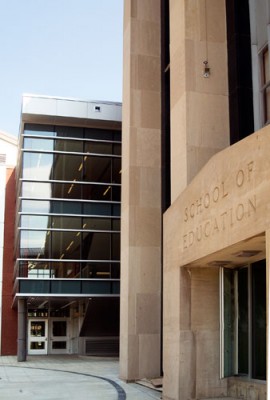Charter School Choice Could Involve Forfeiting Student Civil Rights
deutsch29 | Mercedes Schneider’s EduBlog
Don’t Blame Bernie; Most People Don’t Get Charter Schools
Education Opportunity Network (Preston Green’s EduShyster blog post cited)
What Do Many Charter Schools and Subprime Loans Have in Common? Too Much.
NEA Today (Research by Preston Green cited)
Neag School Faculty and Graduate Students to Present at 2016 AERA Annual Meeting in April
More than 50 faculty researchers and graduate students from the Neag School of Education will be presenting at this year’s American Educational Research Association (AERA)’s Annual Meeting, taking place Friday, April 8, through Tuesday, April 12, in Washington, D.C.

The Neag School’s attendees will present academic papers, serve as invited speakers, participate in roundtable discussions, lead professional development courses, and accept awards conferred to them by various divisions of AERA.
The theme of the 2016 AERA meeting is “Public Scholarship to Educate Diverse Democracies.” More than 2,500 sessions are scheduled over the course of the five days.
View a complete listing of the Neag School’s faculty and graduate student AERA sessions at s.uconn.edu/aera2016.
The AERA Annual Meeting is the largest gathering of scholars in the field of education research, showcasing innovative studies in topics as diverse as STEM, social justice, game-based learning, diversity on campus, and professional development.
Access a PDF of the Neag School’s sessions here, which lists the dates, times, and other details regarding sessions that feature faculty members and graduate students affiliated with the Neag School of Education.
Attend a Professional Development Seminar Led by Neag School Faculty
Three Neag School faculty members will also be heading up professional development courses during the 2016 AERA Annual Meeting.
Assistant professor Milagros Castillo-Montoya – along with colleagues from the University of Southern California and University of Utah – will be presenting a professional development course for experienced and new graduate-level instructors interested in actively addressing racism through their curriculum. The course, titled “Centering Race and Racism Through Action Inquiry in Graduate Education,” will take place Friday, April 8, from 8 a.m. to 3:45 p.m. Find more information, including a course summary and cost, here.
Associate professor Noel Card will co-lead a professional development course titled “Introduction to Systematic Review and Meta-Analysis.” Card will be joined by colleagues from Vanderbilt, the University of Chicago, the University of Nebraska-Lincoln, and Abt Associates, Inc. The session is scheduled for Thursday, April 7, from 8 a.m. to 3:45 p.m. Find details regarding this session here.
Professor D. Betsy McCoach, along with a colleague from the Ohio State University, will present a professional development course titled “An Introduction to Hierarchical Linear Modeling for Education Researchers” on Friday, April 8, from 8 a.m. to 3:45 p.m. Find further details here. Unable to attend this session in person? You can live-stream this session via the AERA-Virtual Research Learning Center; be sure to register here to participate via live-streaming.
All professional development seminars were crafted based on consideration of more than 50 submissions and a competitive peer review process.
Neag School Reception
The Neag School will also host a reception at the Walter E. Washington Convention Center, Level One, Room 151 B, on Saturday, April 9, from 7-9 p.m. Dean Richard Schwab will be in attendance, as well as the School’s incoming dean, Gladis Kersaint.
The full AERA program, listing all sessions featuring participants from across the country, is available online on the AERA website.
To follow the conversation on Twitter, use the hashtag #AERA16.
U.S. News & World Report: Neag School Ranks Among Nation’s Top 20 Public Graduate Schools of Education

U.S. News & World Report released its annual national rankings of graduate schools of education on March 16, 2016, with the Neag School of Education ranking No. 26 in the nation, up five slots this year from No. 31. Among public graduate schools of education, the Neag School ranks at No. 16, up from No. 21. University of Maryland, College Park, also a public institution, is tied with the Neag School. This is the second consecutive year in which the Neag School saw a rise in its U.S. News rankings.
In addition, the 2017 U.S. News rankings ranks four of the Neag School’s specialty programs among the top 20 in the nation:
- Special Education, No. 12
- Educational Psychology, No. 14
- Secondary Teacher Education, No. 14 (tie)
- Educational Administration and Supervision, No. 18 (tie)
“We continue to have immense pride in our Neag School faculty scholars and our exceptional student body. It is their talent and ongoing hard work from year to year that helps to earn the Neag School this level of distinction.”
— Dean Richard L. Schwab
The methodology used for the U.S. News rankings of specialty programs differs from overall rankings, in that the former are based solely on nominations by education deans and education school deans of graduate studies.
“With the U.S. News & World Report Best Graduate School rankings among several of the ratings systems in effect today, it is a pleasure to have our strengths as a leading school of education recognized in this way,” says Dean Richard L. Schwab. “We continue to have immense pride in our Neag School faculty scholars and our exceptional student body. It is their talent and ongoing hard work from year to year that helps to earn the Neag School this level of distinction.”
Graduate education programs at 376 schools granting education doctoral degrees were surveyed in the fall of 2015; 255 schools provided the data needed to calculate rankings based on 10 specific measures, including student selectivity and research activity. Complete information regarding U.S. News rankings methodologies for 2017 can be accessed here.
Find a complete list of the 2017 U.S. News & World Report Best Education Schools rankings online.
Signing Their Rights Away
EduShyster (Preston Green Weighs in on Student Rights in Charter Schools)
